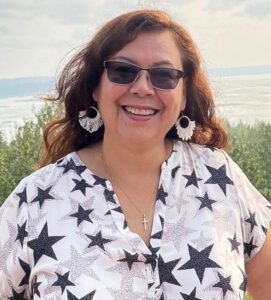“The French language community has struggled hard to achieve recognition of their language in the NWT. Their work serves as a model in many ways for the work, which is needed on Dene languages.”
Former languages commissioner Fibbie Tatti, in her 2004 report to the Assembly
The erosion of Indigenous languages is “alarming” and requires “immediate steps be taken” to prevent further losses to these historic mother tongues, says NWT Languages Commissioner Brenda Gauthier.
Eleven per cent of residents speak an Indigenous language – a slight drop over five years – with only Inuktitut speakers enjoying an increase.

This will be NWT Languages Commissioner Brenda Gauthier’s final report, as she is retiring. (Photo courtesy of Commissioner’s Office)
English is the most commonly spoken language at home for the vast majority of the population (87 per cent). French comes in a distant second, with 1.5-per-cent speaking their language at home.
Brenda Gauthier is languages commissioner of the Northwest Territories.
“It’s the structure with the legislation. It’s kind of confusing, whereas different departments can create and fix the legislation that applies to their area, when I make my suggestions or recommendations, it goes to a standing committee at the Legislative Assembly and that standing committee can make recommendations,” Gauthier said in a recent interview.
“However, it’s up to the Minister responsible and the department to implement or make those changes. So, it’s very challenging, because basically, if I’m left to make changes, have to go to the Minister responsible for official languages and convince them that I need to have more powers to provide more oversight on what they’re doing.”
Caitlin Cleveland is minister responsible for Official Languages.
“Absolutely the investment coming into the territory for French language services from the federal government far exceeds the investment being made into the territory for Indigenous languages.
“The GNWT does its best to continue to fund additional dollars into Indigenous languages in the territory as well, and that’s something that’s incredibly important.”
Cleveland said she needs to determine what the future of languages legislation in the Northwest Territories looks like with her colleagues in the 20th Assembly.
From 1989 to 2019, the percentage of Northwest Territories residents 15 years old and older able to converse in English and French increased by 1.4 per cent and 5.4 per cent respectively.
The percentage of residents able to converse in Tłįchǫ decreased from 6.6 per cent to 6.1 per cent. With respect to all other Indigenous Official Languages, all language groups saw a decrease in the ability to converse, with the largest decreases being in South Slavey (1.8 per cent), North Slavey (1.6 per cent), and Chipewyan (1.5 per cent).
Stated Gauthier in her report: “These statistics are alarming and require that immediate steps be taken to ensure the health of all Official Languages.”
This evening, starting at 5:30 p.m., the Government Operations Committee receives a briefing from Commissioner Gauthier about her latest report.
The public and media can attend as observers, or follow online ntassembly.ca, the Assembly’s Facebook, or YouTube platforms.

